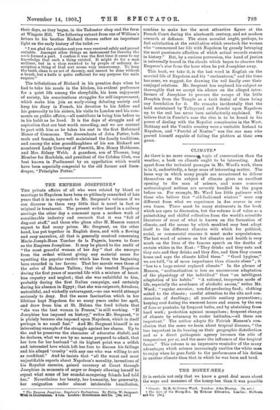THE EMPRESS JOSEPHINE.*
THE private affairs of all who were related by blood or marriage to Napoleon have been so pitilessly ransacked of late years that it is no reproach to Mr. Sergeant's volumes if we can discover in them very little that is novel in fact or original in treatment. The present writer heard in a railway carriage the other day a comment upon a modern work of considerable industry and research that it was "full of dug-out stuff," and those who glean after M. Masson cannot expect to find many prizes. Mr. Sergeant, on the other hand, has put together in English dress, and with a flowing and easy narrative, all that is generally received concerning Marie-Joseph-Rose Tascher de la Pagerie, known to fame as the Empress Josephine. It may be placed to the credit of " the most graceful woman of her day " that she emerges from the ordeal without giving any material cause for upsetting the popular verdict which has from the beginning been recorded in her favour. That her morals were those of the salon of Madame Tallien ; that she treated Napoleon during the first years of married life with a mixture of heart- less coquetry and neglect; that she was unfaithful to him, probably during the first Italian campaign, and certainly during his absence in Egypt; that she was exigeante, frivolous, untruthful, and wickedly extravagant,—no one would attempt seriously to deny. But the same fascination which in her lifetime kept Napoleon for so many years under her spell, and drew from him at St. Helena the fond tribute that "she was the best woman in France," is still working. "If Josephine has imposed on history," writes Mr. Sergeant, "it is plainly because she imposed upon Napoleon, which in itself perhaps is no small feat." And Mr. Sergeant himself is an interesting example of the struggle against her charm. Up to the end he preserves the character of advocatus diaboli, and he declares, what we are by no means prepared to admit, that her love for her husband "at its highest point was a selfish and interested love which left her free to discuss his failings and his alleged 'cruelty' with any one who was willing to act as confidant." And he insists that "all the worst and most unjustifiable reports about Napoleon's morality, inventions of his Royalist enemies, gained currency at Court through Josephine in moments of anger or despair allowing herself to repeat what some of her seandal-mongering friends had told her." Nevertheless her beauty, her humanity, her generosity, her resignation under almost intolerable humiliation, • The Empress Josephine: Napoleon's Enchantress. By Philip W. Sergeant. With Si Illustrations. 11 vols. London: Itatohinson and 'Co. [Us. net.] combine to make her the most attractive figure at the French Court during the nineteenth century, and set modern research at defiance. The stern moralist ought, perhaps, to feel satisfaction at the retribution which-overtook the woman who "commenced her life with Napoleon by grossly betraying the most passionate affection of which actual records remain in history." But, by a curious perversion, the hand of justice is universally traced in the clouds which began to-obscure the Emperor's star from the hour when he put Josephine away.
This book, we take it, is the last word in English on the married life of Napoleon and his "enchantress," and the time has come, we suggest, for drawing the veil finally over their conjugal relations. Mr. Sergeant has explored his subject so thoroughly that we accept his silence on the alleged inter- ference of Josephine to procure the escape of the little Dauphin from the Temple as a tacit denial of there being any foundation for it. He remarks incidentally that the hold maintained by Talleyraud and Fouche upon Napoleon up to the end has never been satisfactorily explained. We believe that in Fouche's case the clue is to be found in his power of dealing with the Royalist conspiracies in the West. Brittany and the Vendee country were a veritable Ireland to Napoleon, and " Fouche of Nantes" was the one man who proved himself capable of foiling the plotters at their own game.










































 Previous page
Previous page